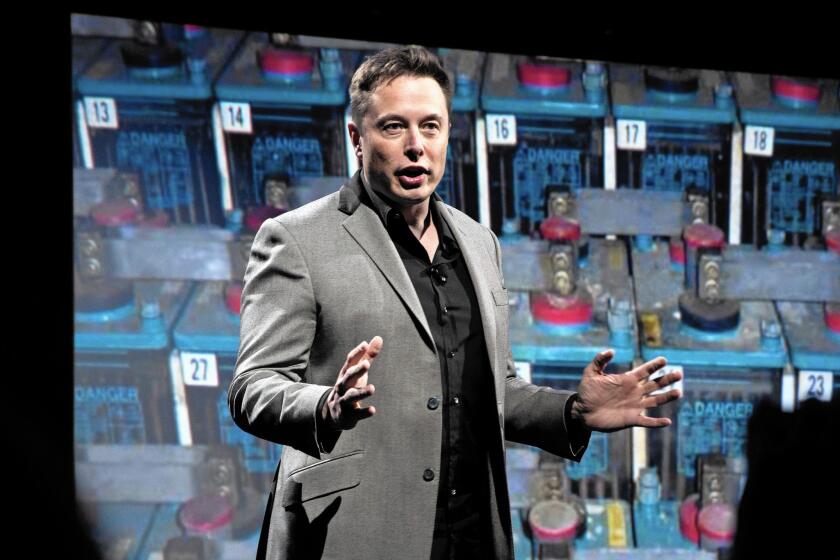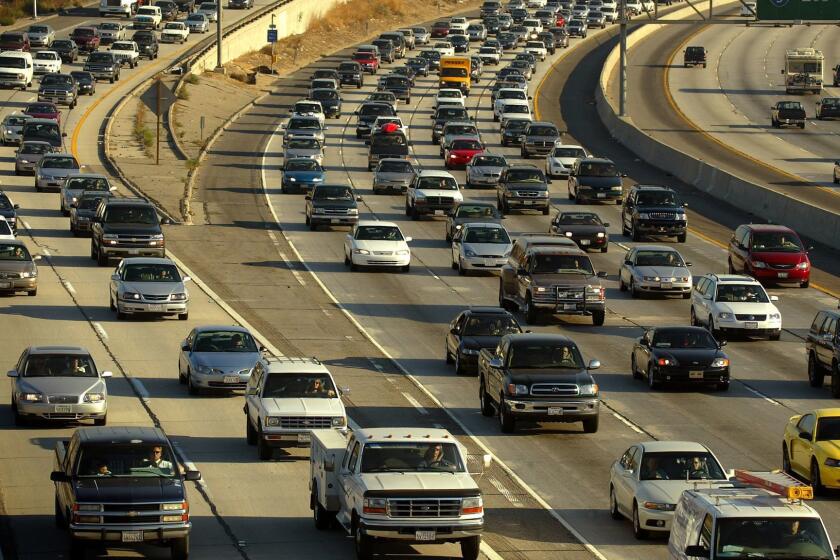Column: Elon Musk’s moving Tesla’s HQ to Texas is mostly about posturing

Elon Musk’s corps of sycophants, along with promoters of the age-old Texas vs. California competition, cheered and chortled last week when Musk announced he was moving the headquarters of his Tesla electric vehicle company from Silicon Valley to Austin.
Chief among them was Texas Gov. Greg Abbott, who bragged about Texas being “the land of opportunity and innovation.” A certain big East Coast newspaper headlined that Musk’s announcement was a “blow to California.”
Let’s take a deep breath on this one.
Just to be clear, we will be continuing to expand our activities in California....This is not a matter of sort of Tesla leaving California.
— Elon Musk
Musk’s announcement of Tesla’s headquarters move to Austin from Palo Alto isn’t all that it seemed on first blush.
From the outside, the announcement tended to be viewed in the context of Musk’s repeated grousing about California business regulation — especially attempts by local officials in Alameda County to force Tesla’s Fremont auto plant to comply with anti-pandemic measures last year.
Get the latest from Michael Hiltzik
Commentary on economics and more from a Pulitzer Prize winner.
You may occasionally receive promotional content from the Los Angeles Times.
That wasn’t the case from the inside. The lone rationale Musk gave during Tesla’s annual meeting Thursday was different. There, he cited the high cost of housing and the long commutes burdening Tesla employees. In any event, the headquarters relocation wasn’t entirely news: Musk first announced his intention to move Tesla’s headquarters out of California in May 2020, in the teeth of his fight with Alameda County.
At that time he also threatened to shut down the Fremont plant, “dependen[t] on how Tesla is treated in the future.”
In the fullness of time, the threat to Fremont turned out to be a bluff. At the annual meeting Thursday, he stated that Tesla’s “intention is to actually increase output from Fremont,” along with that of the company’s battery plant in Nevada, by 50%.
At the moment, Fremont’s workforce numbers about 10,000. The size of the headquarters staff in Palo Alto isn’t known, but it’s certainly in the hundreds. The company hasn’t said how many would be asked to relocate to Austin.
“Just to be clear,” he said, “we will be continuing to expand our activities in California.... This is not a matter of sort of Tesla leaving California.”
Still, the headquarters announcement offers an opportunity to examine the relationship of Musk and Tesla with California.
Has Elon Musk worn out his welcome in California at last?
Moving Tesla’s HQ to Texas may benefit Musk personally more than his company, because Texas has no income tax and California’s income tax tops out at 13.3%. Depending on whether and how Musk exercises the stock options that constitute his compensation and the course of Tesla’s share price, he’s in line for tens of billions of dollars in income in coming years.
Like most major U.S. corporations, moreover, Tesla is incorporated in Delaware, thanks to that state’s management-friendly corporate regulations. There are no signs that’s going to change.
Put this all together, and it becomes evident that Tesla’s headquarters move is mostly about posturing, with a touch of Muskian hypocrisy thrown in.
Last year, at the time of his original threat, I asked whether Musk needs California more than California needs Musk, and concluded that the answer was the first.
So let’s look at where the balance lies.
For a start, Tesla has been treated exceptionally well by California. Gov. Gavin Newsom was essentially correct when he observed after the headquarters announcement that the company had benefited from “hundreds of millions of dollars” in state-funded benefits.
Tesla buyers received $334.7 million in state rebates between March 2010 and Jan. 31 this year, according to state statistics. That’s almost half of the $688.6 million in rebates handed out to buyers of battery-powered electric vehicles, the category that covers Tesla cars. Tesla buyers have also been eligible for rebates provided by utility companies.
One clean-energy website has reported that the state’s layers of environmental rewards and rebates could reduce the cost of a Tesla vehicle by $13,000, depending on the location and income level of the purchaser. That would bring the cost of the lowest-priced Tesla Model 3 down to about $26,000 from the list price of $39,000.
A judge’s ruling blocking the new Texas abortion law lays out how malevolent it is.
Texas doesn’t offer Tesla buyers rewards on anything like that scale. Tesla’s own roster of available state rebates doesn’t list anything that Texas offers Tesla buyers, though some local utilities provide rebates for the installation of charging equipment at buyers’ homes.
Although the California rewards and rebates are generally paid to the buyers, not the company, obviously they have a lot to do with Tesla’s marketing successes in the state, which accounts for nearly half the company’s U.S. sales.
That also reflects California’s aggressive policies aimed at shifting vehicles from gasoline power to electric.
As of 2018, the latest year for which figures are available, California led the nation in per capita EV registrations, at 11.96 per 1,000 population, more than twice the runner-up, Washington state. The figure for Texas was only 1.36, less than half the national average of 3.0. The figures covered all-electric vehicles and plug-in hybrid-electric vehicles.
California policies are designed to encourage even more EV purchases. Newsom last year signed an executive order banning the sale of new gasoline-powered cars and light trucks in the state by 2035. It’s hoped that the order will not only drive auto buyers to electric vehicles before the ban takes effect, but spur a build-out of EV charging infrastructure.
Not that anyone should expect Tesla, any more than any other corporation, to respond to such policies with an emotion as nebulous as gratitude.
On the other hand, Texas has outmatched California in tax abatements and other handouts to the company.
California’s ban on gas-fueled vehicles calls the auto industry’s bluff on zero emissions
According to the subsidy trackers at Good Jobs First, state and local authorities in Texas gifted Tesla with more than $65.4 million in subsidies, chiefly property tax abatements, to attract a Tesla factory to Austin. California has provided only about $15.6 million in state-level job development funding.
That doesn’t suggest that Texas is better at offering companies blandishments, but that Texans are bigger dupes. California’s $15.6-million handout is aimed at the creation of 4,400 jobs; Texas will fork over more than four times as much for a guarantee of only 5,000 jobs.
Then there’s the question of state regulations. As we’ve reported, Musk has been silent about a Texas policy with potentially vast repercussions for its in-state workforce. That’s the state’s new, outlandishly restrictive anti-abortion law. The law imposes a prohibition against abortions that is manifestly unconstitutional, and also allows any individual, even those from out of state, to sue anyone they deem to have aided or abetted a prohibited abortion. That’s an “innovation,” all right, though not one most responsible government officials would boast about.
Texas Gov. Abbott claimed after the law took effect on Sept. 1 that Musk told him he “had to get out of California because, in part, of the social policies” in California and that Musk “consistently tells me that he likes the social policies in the state of Texas.”
Offered an opportunity to clarify, Musk tweeted, “In general, I believe government should rarely impose its will upon the people, and, when doing so, should aspire to maximize their cumulative happiness. That said, I would prefer to stay out of politics.”
Musk’s aversion to politics is selective, at best. Last year he threw a succession of theatrical conniption fits over state and local regulations aimed at slowing the spread of COVID-19. He reopened production at the Fremont plant in direct contravention of county directives, then invited the authorities to arrest him.
They didn’t take the bait, and eventually reached an agreement allowing the plant to resume work. (Musk actually restarted production even before getting permission.) Musk also disdained stay-at-home orders intended to slow the outbreak as “fascist.”
In Texas, Musk won’t have to bother criticizing state anti-pandemic rules. That’s because it doesn’t have any. In fact, Abbott has blocked vaccination mandates and prohibited local officials from imposing measures such as mask mandates.
The harvest of Abbott’s policies is evident. According to the Centers for Disease Control and Prevention, Texas has the sixth-worst COVID-19 per capita death rate in the nation, at 6.1 daily deaths per 100,000 residents over the last seven days; California’s rate is among the best, at 0.7. The new case rate per capita in Texas is 179.8 per 100,000; in California it’s a nation-leading 67.
In some respects, Musk’s rationale for moving Tesla’s headquarters reflects reality on the ground. Housing is inordinately expensive in the Bay Area, as is the land for manufacturing expansion.
“It’s tough for people to afford houses, and a lot of people have to come in from far away,” Musk told shareholders last week. “There’s a limit to how big you can scale in the Bay Area.” (Home prices in Austin are a fraction of those in the Bay Area, though lately they have been rising at a much faster rate.)
Musk is also perfectly aware that it makes sense for a company like Tesla to place manufacturing capacity as close to one’s markets as possible. He also knows that relocating assembly lines can be hugely expensive in terms of capital, time and operational disruption. A corporate headquarters can go almost anywhere; it’s not uncommon for the choice to reflect a CEO’s personal preferences more than corporate interests.
So Tesla’s headquarters move, assuming it takes place at all, won’t represent much of a blow to California, if at all. It may even be a boon, if it shifts Musk’s habitually infantile outbursts about government oversight from California to somewhere else. It’s even possible that state and local officials in Texas will discover that having Musk constantly in their faces isn’t the boon they thought it was. He’s about to become their problem.
More to Read
Get the latest from Michael Hiltzik
Commentary on economics and more from a Pulitzer Prize winner.
You may occasionally receive promotional content from the Los Angeles Times.














